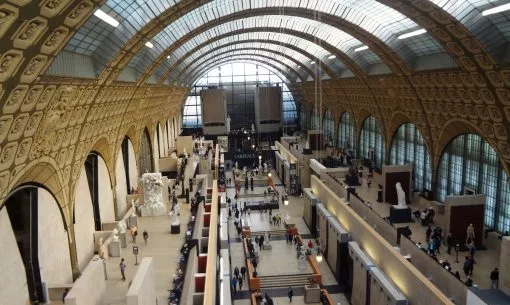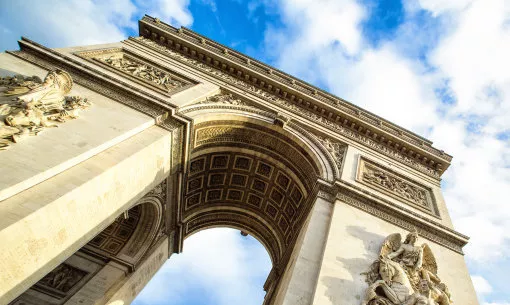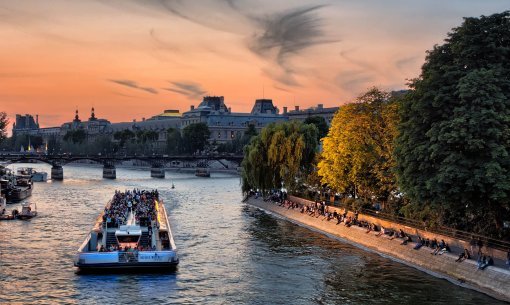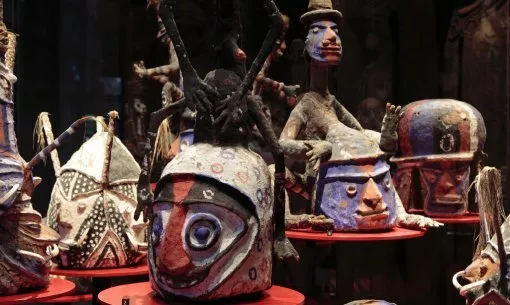What to expect
The Centre Pompidou (Beaubourg) is an architectural masterpiece of the 20th century, situated in the exciting and trendy Marais district, just a few minutes from Saint-Jacques Tower, Hotel de Ville and the Notre Dame cathedral of Paris. Its collection of contemporary and modern art is the biggest in Europe and attracts visitors from all around the world.
Save time and buy fast-track access ticket to permanent exhibitions at Centre Pompidou. Receive your tickets via email and show them on your smartphone.
Centre Pompidou Opening Times
Every day except tuesdays from 11 am to 9 pm
Thursdays, late night opening until 11 pm (for temporary exhibitions on level 6 only)
Please note: Last entry is 1 hour before closing.
The Permanent Collections
The National Museum of Modern Art offers a large collection of art from artists and creators covering the period from 1905 to 1965. The route offers a chronological progression of pieces of work and the different movements which marked the first six decades of the 20th century (fauvism, cubism, surrealism, lyrical abstraction and cold abstractions).
You will obviously find the modern art icons like Giorgio de Chirico, René Magritte, Piet Mondrian, Jackson Pollock, Andy Warhol, Lucio Fontana, Yves Klein but also Henri Matisse, Pierre Bonnard, Robert Delaunay, Georges Braque, Fernand Léger, Vassily Kandinsky, František Kupka, André Breton, Alberto Giacometti, Jean Dubuffet and Pablo Picasso.
The museum does not only offer paintings and sculptures but also demonstrates the richness of the industrial creation and design of the first half of the 2th century.
Practical information
Free entry for Permanent and temporary exhibitions
- Under 18s (with family and excluding school groups)
- Disabled persons and their carer
- Unemployed persons, upon presentation of a certificate of less than 6 months
Free entry for Permanent exhibitions
- 18-25 year olds (European Union residents and non-European residents living in France)
The cloakroom is open from 11am to 9:50pm and can be found on level 0. It is free for those with an entry ticket to the Pompidou Centre. The following items have to be disposed of in the cloakroom before accessing the museum's permanent and temporary collections: suitcases, backpacks, umbrellas, baby carriers, helmets, bags (maximum: length 35cm / width 15cm / height 30cm), camera stands, apparatus, or camera flashes, selfie sticks.
Please note : Access to the Pompidou Centre is prohibited to visitors with large baggage. The cloakroom will not accept large bags.
Pushchairs and wheelchairs are available from the cloakroom, subject to availability.
The George Pompidou Centre in just a few words
The George Pompidou Centre welcomes over 25,000 visitors each day, making it one of the three most visited monuments in Paris, along with the Eiffel Tower and the Louvre.
It is a building dedicated to public reading, art and contemporary creation. When George Pompidou succeeded Charles de Gaulle in his presidence of the Republic in 1969, one of his first decisions was to turn the capital into a unique cultural epicentre, bringing together a national art museum, a public library, a design centre and a contemporary music institute. It is the grounds of Beaubourg, an empty urban space of 18,000m2 created in 1930 by the destruction of the insalubrious island and which became a wild land, which were chosen for this enormous project.
An international competition was launched with a jury of the most renowned figures including Oscar Niemeyer, Jean Prouvé and Philip Johnson. Out of the 680 projects which were presented, it was number 493 which was chosen. This piece will take up only half of the allocated place in order to leave space for the contruction of an Italian mosaic. This project was thought up by two young architects completely unknown by the public, one English, Richard Rogers, and an Italian, Renzo Piano, who sent it as a joke with no idea that this could have happened. It was however from their fertile imagination, that some years later, a monument inspired by oil rigs and science fiction comics was created, built with a supple, mobile and light architecture.
The structure of the George Pompidou centre is simple but the architects have created it in a very unique way. On the outside, you can see all the complex functions which are usually packed on the inside: the circulation spaces, the big mecanic escalator which has become an attraction just like a fairground ride; the lift, the heating and air conditioning systems, the power supply. Everything is on show in all its bright colours: blue for the water, green for the air, yellow for the electricity, red for the circulation, and water is reserved in giant white mushrooms. The rest of the building is completely empty and allows for the building to become a huge temporary exhibition which offers the continual freedom to invent new configurations of the space as needed.
The Pompidou Centre is firmly faced towards the village for which it has become an undeniable landmark. It towers above the surrounding buildings by almost double, a veritable Parisian monument. Its area is an urban space, the gentle slope upto the building allowing easy and comfortable access to pedestrians. One cannot exactly describe the Pompidou Centre as beautiful, but it is animated and alive and waiting for you!
More about the history of the Pompidou Centre.













